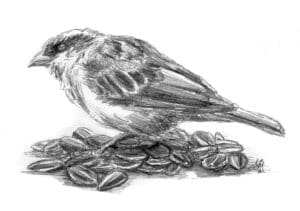Seeing heaven in a wild bird
By LORRAINE V. MURRAY, Commentary | Published January 3, 2024
I saw him on his back, lying on the sidewalk. He was trying to turn himself over, but was having no success. I stopped my car, got out and took a closer look, which made him flap around more violently, no doubt from fear. Should I intervene or leave him to work this out on his own? Would I do more harm than good? The questions were answered by remembering Jesus saying that God notices every sparrow that falls.
This was a catbird, not a sparrow, but I knew the principle applied, so I sprang into action. I called my goddaughter, Sarah, who showed up a few minutes later, armed with a shoe box and a towel. She spoke softly to the bird as she scooped him up and placed him in the box, and then we were off to the vet’s. Since it was Sunday, our options were limited, so we headed to a nearby emergency vet’s office.
 Unfortunately, this place didn’t treat wild birds, so Sarah went to work researching other possibilities. She discovered a group called AWARE (Atlanta Wild Animal Rescue Effort) and texted them a photo of the bird. They directed us to a bird-rescue organization a short drive away. Once there, we filled out paperwork and gave the little fellow to a friendly lady, who was in the process of rehabbing injured pigeons.
Unfortunately, this place didn’t treat wild birds, so Sarah went to work researching other possibilities. She discovered a group called AWARE (Atlanta Wild Animal Rescue Effort) and texted them a photo of the bird. They directed us to a bird-rescue organization a short drive away. Once there, we filled out paperwork and gave the little fellow to a friendly lady, who was in the process of rehabbing injured pigeons.
I knew there was a possibility this wounded bird wouldn’t make it, but at least we had given him a chance. He was only one creature in a universe of billions of animals, but that day he took on great significance. The poet William Blake wrote that when a skylark is wounded, somewhere an angel stops singing.
Years ago, when I didn’t believe in God, I held a baby squirrel that I’d rescued from our cat. As the little fellow with eyes still shut lay there in my hand, I suddenly had an image of much bigger hands and realized they were God’s. He was holding me in the palm of his hands with as much tenderness as I was showing the squirrel. This moment of insight led me to see God’s fingerprints throughout the world from the smallest bud to the largest mountain.
In Psalm 148, we read about glimpsing God in every part of Nature: “Praise the Lord from the earth, you sea monsters and all deeps, fire and hail, snow and frost, stormy wind fulfilling his command! Mountains and all hills, fruit trees and all cedar! Beasts and all cattle, creeping things and flying birds!” In Psalm 150, we read “Let everything that has breath praise the Lord!”
The story of Jesus’ life shows a deep connection with the natural world. He talked about the wildflowers that lasted only a short time and sheep that stray from the flock. He turned wine made from grapes into his blood and bread made from wheat into his body. He multiplied loaves and fish, entered Jerusalem on a donkey and predicted the cock would crow at Peter’s betrayal. He was the Good Shepherd and also the Lamb of God.
Every tiny beetle, each flower, every butterfly, sea creature, tree and mountain are the work of our heavenly Father’s hands. William Blake wrote about nature’s connection to God: “To see a world in a grain of sand and a Heaven in a wildflower, hold Infinity in the palm of your hand and Eternity in an hour.”
I don’t know whether the little injured bird we rescued that day lived through the night. But in either case, whether he lived or died, I believe that he is in God’s kingdom, flying free.
“The Blind Sparrow” sketch is by Lorraine’s late husband, Jef (www.jefmurray.com). Lorraine’s email address is lorrainevmurray@yahoo.com.